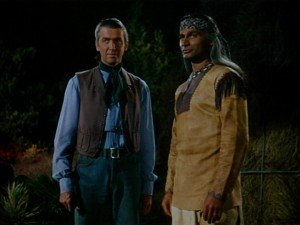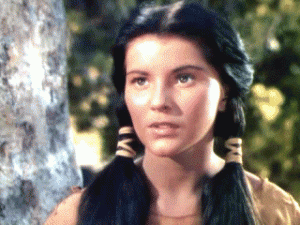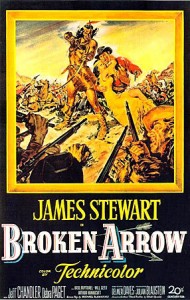Of this motion picture the screen can be proud… Today… Tomorrow… A generation from now…
1950 marked a period where Jimmy Stewart made several westerns. The first of these to be filmed was Broken Arrow, although it was the second to be released; Winchester ’73 was filmed after, but released prior to Broken Arrow.
Although not usually thought of as a western star, Stewart made many westerns and they comprise a sizable piece of his filmography. And, much like Errol Flynn, his large western work is overlooked in favor of work in other genres – in Flynn’s case swashbucklers- even though he starred in more westerns.
The theme of Broken Arrow melds well into Stewart’s post WW2 goal to refuse any work in pictures which glorified combat or violence: his action in the air war in Europe had definitely impacted the young actor, who saw significant combat during the war. This is in stark contrast, as others have pointed out on ocassion, to his friend and fellow actor John Wayne, who shirked wartime military service but went on to star in several major pictures in which he was the great war hero.
 Broken Arrow, at least at a symbolic level, is the selection of peace over war and, as such is depicted in the film. Stewart is a veteran army scout who befriends the Apache under the great leader Cochise (played by Jeff Chandler, who made a cottage industry for himself from the role). After initial distrust and suspicion between Steward and Chandler and mutual respect and friendship slowly forms. From this an initially uneasy peace is arranged with the United States. Along the way there is a romantic subplot as Stewart falls for and eventually marries a young Native American woman, played by Debra Paget.
Broken Arrow, at least at a symbolic level, is the selection of peace over war and, as such is depicted in the film. Stewart is a veteran army scout who befriends the Apache under the great leader Cochise (played by Jeff Chandler, who made a cottage industry for himself from the role). After initial distrust and suspicion between Steward and Chandler and mutual respect and friendship slowly forms. From this an initially uneasy peace is arranged with the United States. Along the way there is a romantic subplot as Stewart falls for and eventually marries a young Native American woman, played by Debra Paget.
We also get a strong performance from Jay Silverheels as Geronimo. Silverheels would later reach fame as the moronic Tonto to Clayton Moore’s Lone Ranger.
 These three strong Native American characters, played by Chandler, Paget, and Silverheels, mark something of a breakthrough for the cinema. Like the significantly later Cheyenne Autumn, Broken Arrow really presents the Native American’s perspective and the Apache people are shown to be full of pride, character, and normal human emotions. This was the first time since sound was introduced to film where Native Americans were portrayed as anything more than insipidly stupid, warlike, and animalistic people to be shown no mercy.
These three strong Native American characters, played by Chandler, Paget, and Silverheels, mark something of a breakthrough for the cinema. Like the significantly later Cheyenne Autumn, Broken Arrow really presents the Native American’s perspective and the Apache people are shown to be full of pride, character, and normal human emotions. This was the first time since sound was introduced to film where Native Americans were portrayed as anything more than insipidly stupid, warlike, and animalistic people to be shown no mercy.
Granted, the Native Americans here are played by caucasians which for some may dull the impact and significance of this perspective. From our perch in 2010 what looks like a serious miscalculation was most likely merely a situation of expediency. Given the significant role major Apache members play in the film it is likely that there simply (as a result perhaps of the industries traditional refusal to use) not enough experienced Native American actors available.
Veteran journeyman director Delmer Daves does a stalwart if pedestrian job here. There are the few required shots a la John Ford of the breathtaking vistas in the area around Monument Valley. Otherwise nothing really stands out directorially. Hugo Friedhofer supplies a strong but not especially memorable score. All of the actors give strong performances, although personally I never find Stewart overly convincing in his western roles. Chandler is particularly good as Cochise, a performance for which he got an Academy Award nomination.
Available on standard DVD, this isn’t the best example of the genre, but far from the worst as well. The action is not like one would see in a John Wayne picture, and the story plays out gradually and it times borders on plodding. Definitely entertaining, but not a classic.

It is worth mentioning something that only a specialist will be aware of. Not only is “Broken Arrow” one of the very first films to take seriously the humanity of native Americans, and to recognize that they have an actual culture, the ceremonies and music presented in the film are actual Apache ceremonies, and, I believe, the correct ones for the purpose used. (I am not a specialist; I learned this from a friend who is.) Director Delmer Daves grew up among Apaches and he had a far more refined understanding of them than any other Hollywood director.